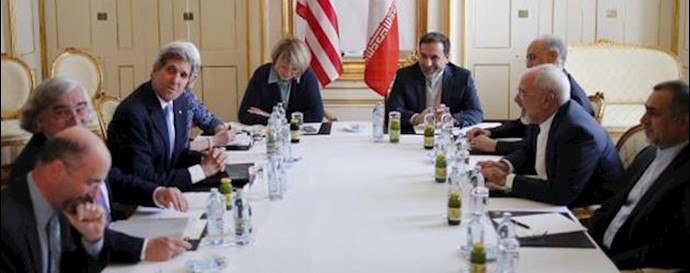VIENNA – Wall Street Journal – July 3, 2015 – Iranian Foreign Minister Zarif said Friday Iran and six major powers are closing in on a final nuclear agreement and urged his negotiating partners to complete the agreement and turn their attention to the “common threat” of violent extremism.
“At this 11th hour, despite some differences that remain, we have never been closer to a lasting outcome,” Mr. Zarif said in a video message released Friday evening, days from the July 7 deadline for the talks.
“But there is no guarantee,” he said. “They have opted for the negotiating table,” he said of the six-power group, “but they still need to make a critical and historic choice: agreement or coercion.”
Western officials have said the nuclear talks are making progress but have also said a number of differences remain in reaching deal that would block Iran’s path to a nuclear weapon in exchange for lifting sanctions.
They have urged Iran to make some political choices to seal an agreement.
Earlier in the day, the head of the International Atomic Energy Agency said Iran and the United Nations atomic agency have worked out “some ways forward” to deal with questions about Tehran’s past nuclear activities, but work is needed to flesh this out.
IAEA Director-General Yukiya Amano traveled to Tehran on Thursday in what western and Iranian officials described as an important visit that could help unlock a final nuclear agreement. Mr. Amano met with Iran’s President Hasan Rouhani and other top officials.
The visit came ahead of a July 7 deadline to complete nuclear negotiations between Iran and six world powers. Concerns about Iran’s past nuclear work and Iranian reluctance to allow IAEA inspectors to visit sensitive military sites are two of the issues complicating the nuclear talks.
Iran is negotiating with the six-power group—the U.S., Russia, China, the U.K., France and Germany—a final agreement that would block its path to nuclear weapons in exchange for lifting tight international sanctions.
In a brief statement on Friday, Mr. Amano said that he went to Iran to advance work on resolving the “outstanding issues” the agency has raised about Iran’s nuclear program, including concerns that Tehran had worked on nuclear weapons know-how.
“I believe that both sides have a better understanding on some ways forward, though more work will be needed,” Mr. Amano said.
Iranian officials said Mr. Amano’s talks yielded significant progress although western diplomats close to the nuclear talks have been more cautious.
“We are very hopeful that the possible military [nuclear] dimensions issue is being resolved and progress has been achieved,” said Iranian Deputy Foreign Minister Abbas Araghchi, according to Iranian media reports. “We too are ready for cooperation with Mr. Amano to clarify that the Iranian claims have been baseless.”
While Mr. Amano was in Tehran, negotiations continued around the clock in Vienna, with western diplomats signaling that there was progress, albeit slow.
Rouhani’s chief of staff, Mohammad Nahavandian, an economist and leading businessman, left Tehran for the Vienna talks, according to Iranian media.
A senior U.S. administration official said that the chief U.S. and EU negotiators met with Iran’s top diplomats for six hours until 3 am on Friday morning.
A meeting between U.S. Secretary of State John Kerry and Iranian Foreign Minister Javad Zarif was postponed until the evening and Mr. Kerry was huddled with his negotiating team on Friday afternoon.
U.S. Energy Secretary Ernest Moniz and the head of Iran’s atomic energy agency Ali Akbar Salehi were also meeting Friday afternoon.
“It is still quite difficult, we have made some progress on a certain number of things,” said one western diplomat. “As you imagine, the difficulties remain about reaching agreement on the most sensitive points in the negotiations…There we need some political choices.”
Since talks were extended by a week on Tuesday, Iran and the six powers have jockeyed over whether July 7 is a hard deadline. Mr. Zarif said on Wednesday that the Iranian team didn’t consider the July 7 date a hard deadline. The White House and other western officials have said that the window for completing an agreement is now closing.
The western diplomat said that some foreign ministers will return to the talks on Sunday evening for 48 hours but that negotiations cannot run beyond July 7.
“Now we are reaching a little bit at the end of the path. So we must wrap this up in the coming days. We couldn’t really extend this. That is clear,” the person said.
The U.S. and its partners have said that Iran must address its past nuclear work as part of a final agreement. Despite previous promises of cooperation, Iran has only partially addressed two of the 12 sets of questions that the IAEA has raised over Iran’s past nuclear work.
Western diplomats said in April that Iran would be given a list of Iranian scientists, sites and documents that the IAEA should have access to for a period of time so they can shed light on Iran’s past work. People close to the talks have said in recent days that Iran had not yet accepted that list.
U.S. lawmakers have been calling for IAEA inspectors to have anywhere- anytime access to Iranian nuclear and military sites. U.S. officials have acknowledged there should not be systematic inspections of Iran’s military sites.
Minister Urges Nuclear Accord and Turn to ‘Common Threat’ of Extremism
RELATED ARTICLES








